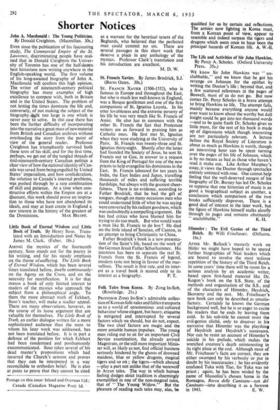AFTER Mr. Bullock's masterly work on Hitler we might have
hoped to be spared further biographies of Nazi leaders which are bound to involve the most tedious repetition of the history of the Third Reich. In some years' time there will be room for a serious analysis by an academic writer, based upon first-hand material like Dr. Kogon's book on the S.S. State, of the methods and organisation of the S.S. and of the characters of Hill-Inger, Heydrich, Skorzeny and the rest. Mr. Frischauer's new book can only be described as unsatis- factory. Certainly he knows the German background well, but he is so eager to excite his readers that he ends by leaving them cold. In his sub-title he cannot resist the evil-genius cliché, only to discover in his narrative that Himmler was the plaything of Heydrich and Heydrich's successors. Nor can he resist an account of Himmler's suicide in his prelude, which makes the wretched creature's death uninteresting in its right place at the end. Although most of Mr. Frischauer's facts are correct, they are either swamped by his verbosity or put in doubt by his inaccuracies ; he has evidently confused_ Tuka with Tiso, for Tuka was no priest ; again, he has been misled by the name of Mussolini's chosen home in the Romagna, Rocca delle Caminate—not del Caminato—into describing it as a fortress


































 Previous page
Previous page